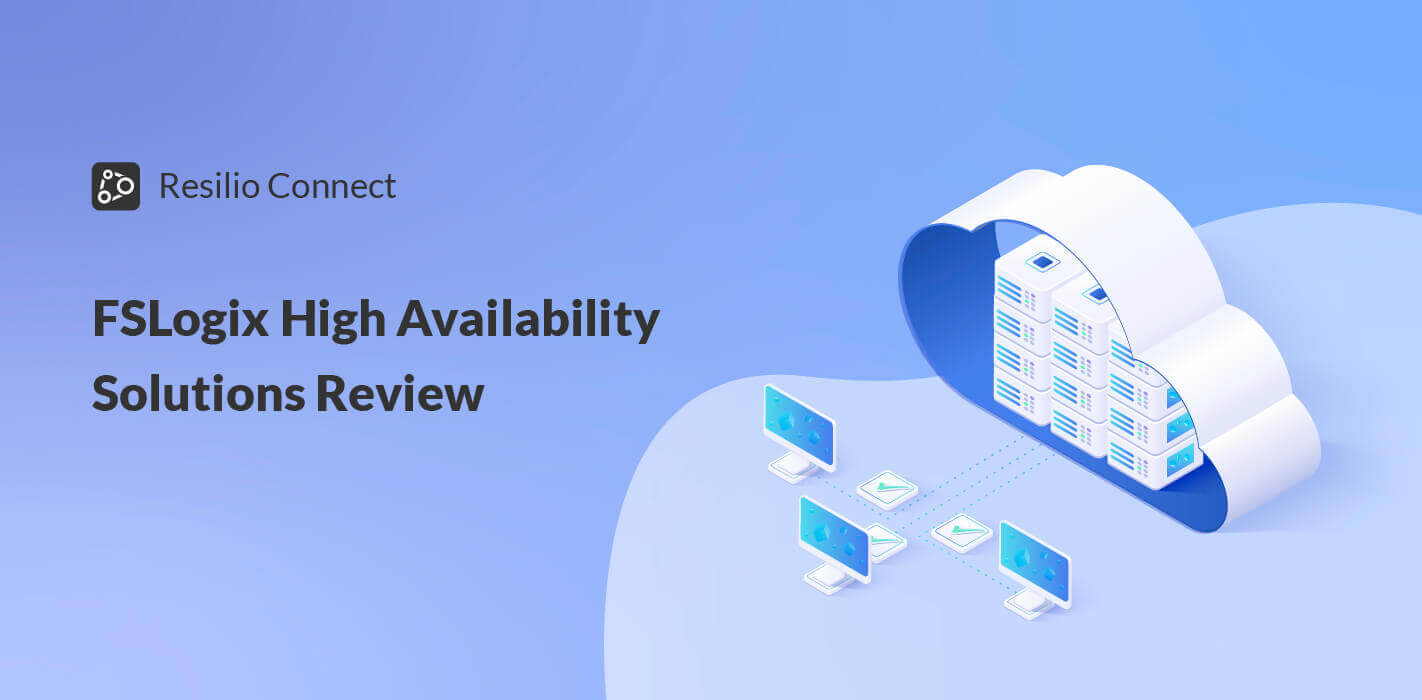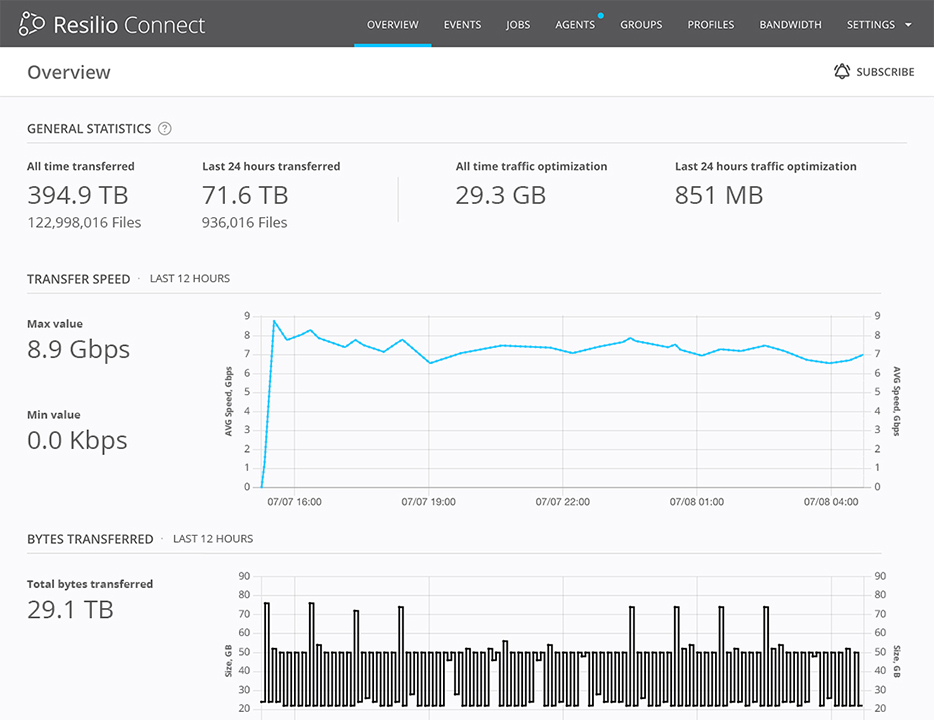Maintaining high availability for virtual desktop infrastructure (VDI) running Microsoft Windows, Office 365, and other applications—without compromising performance—is mission critical for businesses of all types and sizes. Yet, maintaining active-active high availability across sites—without degrading the user experience or data synchronization performance—poses a new set of challenges using conventional storage or file replication tools, especially in multi-site or hybrid cloud environments.
FSLogix Profile Containers
FSLogix by Microsoft was designed to improve the virtual desktop user experience and simplify profile management for virtual desktop infrastructure (VDI). Keeping the VDI infrastructure and applications available and resilient to infrastructure problems is crucial for data availability and keeping businesses running. Administrators that deploy FSLogix profile and Office 365 containers need to provide high availability for FSLogix profile containers and all VHDs.
Real-Time Data Synchronization for FSLogix Profile Containers
Resilio’s Real-Time VDI Synchronization Solution complements Microsoft FSLogix to enable true active-active high availability (HA), rapid user login, and simplified management for multi-site VDI environments, using nearly any type of storage, on-premise and cloud. Using Resilio Connect for real-time data synchronization minimizes end-to-end replication latency across sites. The big benefits: user profile data and FSLogix containers are rapidly replicated across sites, avoiding latency and speeding up login performance, vastly improving the consistency and predictability of the end-user experience at login.
HA Options for FSLogix
When developing a highly available solution, Microsoft customers consider two primary deployment options:
Option 1: Use FSLogix Cloud Cache
FSLogix Cloud Cache solves several conception issues. First, it provides a local copy of cached hot profile data of the container for the user profile, which reduces the network and CPU load of the file server. All read operations are performed locally, which significantly improves user experience in some cases. Using local cache also overcomes temporary outage of the infrastructure. All changes to profiles are stored locally first and then can be replicated to a profile storage location. You can specify several profile locations that will automatically create infrastructure highly available in an active-active configuration.
While this sounds like a perfect solution, this option has several major issues:
- You need to provide enough storage capacity and performance (IOPS) for the cache.
- Longer logon and logoff time due to a need to pre-load cache and flushing the cache back to the storage locations.
- Depending on the size of your FSLogix profile containers and Office containers, doing so could translate into significant delays that could impact user performance.
Option 2: Leverage VHD locations and replicate data between these locations using other solutions
Using tools such as DFS-R, Robocopy, or Rsync, you may be able to deliver an active-passive high availability solution. Resilio’s Real-Time VDI Synchronization Solution, by contrast, can be used to deliver an all-active solution, optionally. In either case, Option 2, won’t affect logon/logoff time and will not require any hardware updates. This approach may be also be preferred for roaming profiles, when you can implement a more complex replication strategy between on-premise file share servers in different locations and blob or file storage in the cloud.
It is still a preferred solution for some customers to achieve meaningful results now and have time to plan a proper deployment and improvement of the VDI, or when logon time is critical to maintain the user experience.
VHD/VHDX Replication Options
DFS-R
The Distributed File System Replication (DFS-R) service is an integrated Windows service that replicates data between data centers. DFS-R monitors changes to NTFS and replicates only changed blocks between Windows servers. DFS-R shows acceptable performance over the LAN. However, depending on networking conditions, DFS-R may be completely non-operational over the WAN. When you need to replicate FSLogix containers outside the office over the WAN, consider using other products such as Resilio Connect (see below). Another major issue of DFS-R is a lack of visibility and reporting for replication. DFS-R can significantly vary replication time, sometimes up to 50x slower than Resilio, or replication can even completely stall without a clear way to detect or resolve the issue. DFS-R is not the preferred solution if you want to replicate VHD files geographically across sites or to the cloud.
Robocopy
Robocopy is the file copy tool for Microsoft Windows. It provides basic, serialized copy operations between two locations. Because of its simplicity and wide availability, some people decide to use it for copying profile containers between storage devices. The obvious limitations of this approach are that you need to develop a set of scripts to make it robust (survive restart, report errors, etc.) to make it viable to work in the production environment. It can’t monitor folders for changes, so you need to periodically start it to perform copy operations. This delays time to replicate containers. Like DFS-R, Robocopy uses TCP and is extremely slow and unpredictable when sending containers over the WAN. To learn more about Robocopy’s limitations, please read our Robocopy blog post.
Rsync
Rsync is a well-known tool to effectively keep folders synchronized. It is very effective in detecting changes and making sure the folders are the same. It uses checksums to guarantee that files are identical after the transfer. While it is very effective in LAN, performance is significantly reduced over the WAN. You can’t use it to synchronize and replicate containers directly to blob storage in the cloud. You will also need additional scripts to make this work reliable in your production environment. Rsync can’t use real-time detection changes and needs a constantly rescan folder to detect changed files. To learn more about Rsync’s limitations, please read our Rsync blog post.
Resilio Connect
Resilio Connect’s Real-Time VDI Synchronization Solution is the best solution to replicate FSLogix profile containers and user data. Resilio Connect avoids latency when replicating FSLogix profile containers and user data across sites. Both simple bi-directional and N-way multi-directional (1 to many, many to many) sync are supported.
Resilio Connect monitors a folder for file changes and initiates replication in seconds. Only the changed blocks or parts of the VHD file that have changed are replicated. By rapidly replicating real-time changes across locations, FSLogix container profiles and user data are available when users need to login. Resilio brings consistency and predictability to the user experience. This translates to faster user login times, which could be up to 2x faster than conventional storage replication or sync solutions.
Resilio Connect enables true active-active high availability (HA), rapid user login, and simplified management for multi-site VDI environments, using any type storage. The Resilio solution for FSLogix is location-independent, working well within an office (LAN), outside the office to remote workers (WAN), or across any network to any number of locations.
Moreover, customers have a lot of flexibility. They can use their own storage on-premise and their choice of cloud. On-premise storage can be DAS, NAS, or SAN. In the cloud, Resilio supports Microsoft Azure, AWS, Google Cloud (GCP), Wasabi, Backblaze, IBM, and Oracle, among others. Out-of-the-box, Resilio supports object storage such Microsoft Azure Files, Azure Blobs, Azure NetApp Files, Amazon S3, Google Cloud (GCP), Oracle, Wasabi, and Backblaze—all can be used either natively or in a hybrid configs. Citrix, Microsoft, and VMware virtualization platforms are supported as well. If you would like to learn how an innovative Fortune 500 company delivers a hybrid cloud Virtual Desktop Infrastructure (VDI) solution with Resilio Connect, please read our case study.
As part of the replication process, jobs can be optionally configured to replicate metadata such as NTFS permissions. Finally, through Resilio’s centralized management console, administrators gain visibility and control of replication jobs: allocate and control bandwidth, set job priority, automate and monitor all aspects of data synchronization.
| Connect | DFS-R | Robocopy | Rsync | |
| 1:1 replication | ✔ | ✔ | ✔ | ✔ |
| 1:n replication | ✔ | |||
| Real-time replication | ✔ | ✔ | ||
| Diff replication | ✔ | ✔ | ✔ | |
| WAN optimization | ✔ | |||
| Cloud, Blob, SMB | ✔ | |||
| Speed | Fast | Slow | Slow | Medium |
| Central management | ✔ | |||
| Reporting | ✔ | |||
| Notifications | ✔ | |||
| Error recovery | ✔ |
Learn how Resilio Connect’s Real-Time VDI Sync solution enables active-active high availability, rapid user login, and simplified management for multi-site VDI environments, using any storage. Or, schedule a demo or start a free trial to see for yourself.






